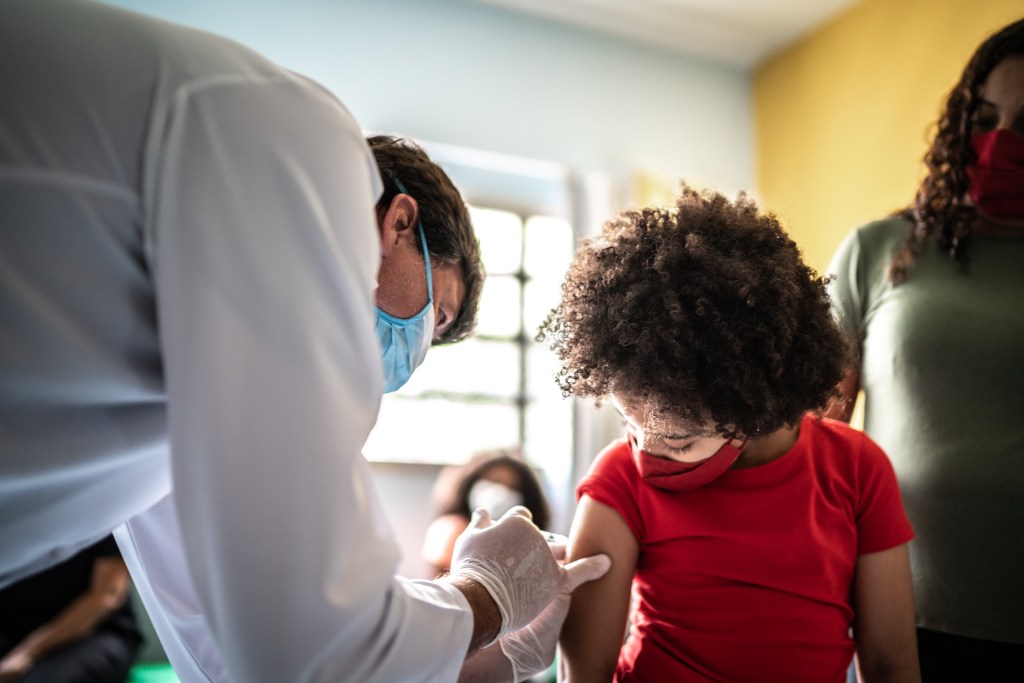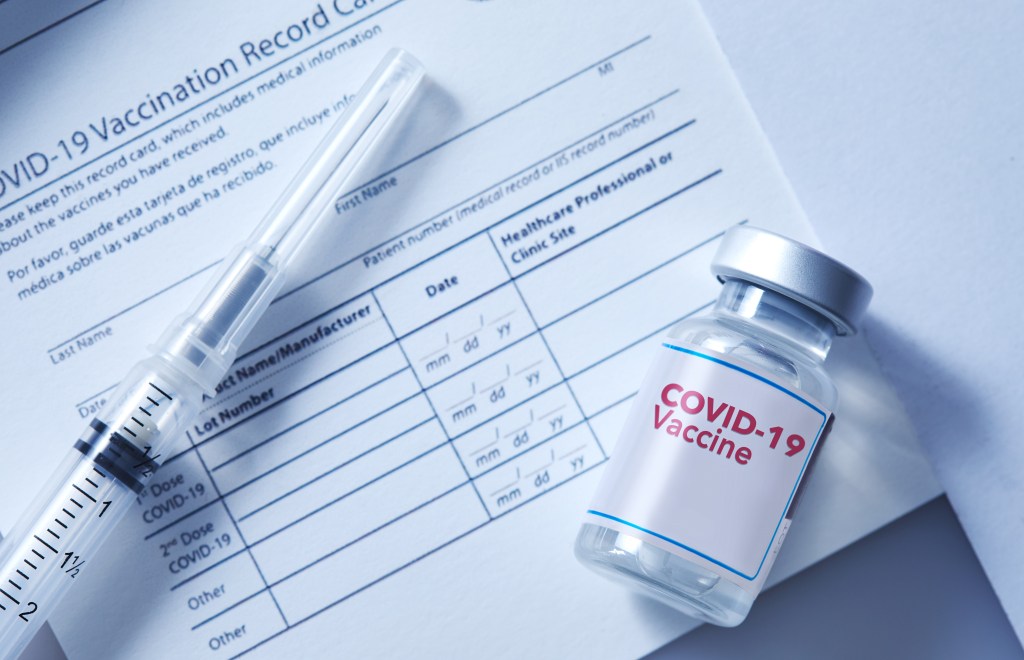
The independent source for health policy research, polling, and news.
VOLUME 6
Vaccine Misinformation Spreads as Children Head Back to School
This is Irving Washington and Hagere Yilma. We direct KFF’s Health Misinformation and Trust Initiative and on behalf of all of our colleagues across KFF who work on misinformation and trust we are pleased to bring you this edition of our bi-weekly Monitor.
Summary
This edition highlights vaccine hesitancy and misinformation around MMR (measles, mumps, and rubella) vaccines as children return to school and measles cases resurge in parts of the U.S. We also examine emerging narratives around COVID-19 vaccine misinformation following the FDA approval of COVID-19 boosters and false claims linking mpox to the vaccines. Additionally, a review of recent research explores strategies to combat MMR vaccine hesitancy, and we discuss the growing use of AI in academic papers.
Recent Developments
Addressing Vaccine Hesitancy Around MMR and Childhood Immunizations as Measles Resurges
As students return to school, state health departments have urged families to make sure their children are up to date on recommended vaccinations. Without these immunizations, children risk contracting preventable diseases such as measles, which has seen a resurgence in several states. However, a KFF analysis highlights that routine immunization rates for kindergarteners have not returned to pre-pandemic levels, in part due to vaccine hesitancy fueled by misinformation and partisan politics. Persistent false claims include the debunked link between vaccines and autism, which has falsely led some to believe that vaccines are more harmful than the diseases they prevent. These claims downplay the severity of measles and dismiss it as rare or harmless. They also commonly suggest delaying or skipping vaccines for children to avoid unfounded risks, despite the CDC’s evidence-based schedule. These misleading narratives erode public confidence in vaccines, fueling larger and faster outbreaks.
Polling Insights:
While a large share of the public correctly views the false claim that “the measles vaccine is more dangerous than the disease itself” as definitely false, KFF polling from February 2024 finds that most adults express some uncertainty when it comes to this claim. More than half of U.S. adults say this claim is either “probably false” (41%) or “probably true” (16%). Few (3%) believe it is “definitely true,” while about four in ten (38%) are confident that the claim is “definitely false.” (Figure 1). Additionally, there are partisan divides when it comes to definitively identifying the claim as false, with Republicans being less likely to do so. Notably, a quarter of parents of children under the age of 18 say that the false claim that the measles vaccine is more dangerous than the measles infection is definitely or probably true.
The 2023 KFF Health Misinformation Tracking Poll Pilot found similar results for the claim that “The measles, mumps, rubella vaccines, also known as the MMR vaccines, have been proven to cause autism in children.” While most Americans do not believe the statement, the bulk of the public is uncertain, with 43% saying it is “probably false” and 20% saying it is “probably true.” About a third of the public (32%) identify the claim as being “definitely false.” This highlights the ongoing confusion and hesitancy many people face when navigating vaccine misinformation. Partisan differences also emerged on this question with Republicans (33%) being more likely than independents (18%) and Democrats (15%) to say that this statement is definitely or probably true.
Large shares of parents also express uncertainty about whether MMR vaccines have been proven to cause autism in children with a quarter of parents (25%) saying that claim is “probably true” while four in ten parents say it is “probably false.” (Figure 2).
To combat misinformation about the MMR vaccine, health professionals and media outlets can address and debunk common misconceptions like the narratives listed above. Health media resources like The Harvard Kennedy School’s The Journalist’s Resource provide guidance for reporters covering MMR vaccination rates and hesitancy. These resources emphasize the importance of clearly distinguishing between vaccine hesitancy and anti-vaccine beliefs, highlighting the high vaccination rates among U.S. students, and exploring reasons for delayed or incomplete vaccinations.
Emerging Misinformation Narratives
Reemergence of COVID-19 Vaccine Misinformation Following FDA Booster Approval
In addition to the required back-to-school vaccines for children, health officials are recommending that everyone 6 months of age and older receive the updated COVID-19 vaccines this fall. However, misinformation in online conversations indicate that vaccine hesitancy and misinformation may hinder uptake for some. In the days after the FDA approved the booster vaccines, more than half of posts, articles, comments on articles and videos mentioning the COVID-19 vaccines included terms associated with false claims. Many social media posts recycled debunked narratives that emerged during the initial approval of the COVID-19 vaccines, such as claims that the vaccines contain the SV40 virus, cause "turbo cancer," were designed to only profit the government and pharmaceutical companies or were approved too quickly to be safe.
Misinformation has also emerged around specific vaccine types. Online discussions leading up to the FDA’s approval reflected some people’s frustration over the delayed approval of Novavax's non-mRNA COVID-19 vaccine. Some falsely claimed the Novavax COVID-19 vaccine is "over 40% more effective" than other vaccines and that the FDA is "intentionally withholding" it, deepening distrust in the FDA approval process and mRNA vaccines. One post that made this claim had approximately 89,700 views, 3,000 likes, 1,000 reposts, and 50 comments as of August 27th. At the same time, there are also examples of support for the updated boosters. One doctor said, “I’ll get the updated COVID vaccine as soon as it’s available, and I’ll urge my patients to do the same. Getting COVID over and over again is not a great plan.” a post garnering 85,300 views, 3,300 likes, 620 reposts, and 470 comments by August 27th. These examples illustrate that both misinformation and accurate information can circulate on social media and receive comparable levels of engagement.
Recent political statements have further complicated the vaccine discussion. Presidential candidate Donald Trump has pledged to defund schools that mandate COVID-19 vaccines, a move that could exacerbate vaccine hesitancy and negatively impact public health efforts. While Trump previously supported the development and promotion of vaccines, his current stance has raised concerns among health experts about the potential for increased vaccine misinformation and declining vaccination rates. Trump's rhetoric against vaccine mandates could undermine public trust in vaccination programs and jeopardize progress made in controlling preventable diseases.
False Claims Linking Mpox to COVID-19 Vaccines and Lockdowns
Misinformation about the public health response to mpox (formerly known as monkeypox) appeared online after the World Health Organization (WHO) declared the disease a public health emergency. Most of the misinformation falsely claims that the WHO had ordered nations to prepare for "mega lockdowns" because of mpox. Similar misinformation has fueled fears of school closures, despite experts clarifying that mpox spreads primarily through close skin contact, making such drastic measures highly unlikely. Some have also falsely claimed that the WHO has reversed its decision, often using an old video from May 2023 showing the WHO Director General announcing the end of a previous mpox emergency.
Simultaneously, the WHO’s declaration sparked a wave of claims linking mpox to COVID-19 vaccines. Several popular posts in English and Spanish falsely claimed that mpox is a side effect of mRNA COVID-19 vaccines, with some recycling the debunked myth that mpox is an autoimmune skin disease triggered by vaccination. An X post in Spanish shared on August 15 read, “No, there was never any COVID, but rather pneumonia. And no, there is no monkeypox, or bird flu, or anything like that. What there are the after-effects of the ‘vaccines.’” In just 12 days, the post had received approximately 275,200 views, 4,000 likes, 2,500 reposts, and 170 comments.
Research Updates
Research Review Highlights Strategies to Combat MMR Vaccine Hesitancy
A review published earlier this year in Vaccines explored why some people are hesitant to receive the MMR vaccine by examining the role of misinformation and the changing landscape of online communication. The review explains how communities and the way vaccines are presented can influence people's attitudes. Based on these factors, the authors shared evidence-based strategies to address hesitancy, including improving communication between health care providers and patients, developing personalized approaches, and implementing effective public information campaigns.
Source: Higgins, D. M., & O’Leary, S. T. (2024). A World without Measles and Rubella: Addressing the Challenge of Vaccine Hesitancy. Vaccines, 12(6), 694.
AI and Emerging Technologies
Undisclosed Use of AI in Academic Papers
The rise of AI-generated fake scientific papers has the potential to erode public trust in science and contribute to the spread of misinformation, particularly in areas such as health and environmental policy. Often disseminated through platforms like Google Scholar, these papers go undetected by readers and can influence evidence-based decision-making. A recent analysis found that about two-thirds of the papers examined were created, at least in part, using artificial intelligence (AI) without proper disclosure, making it difficult to identify and correct the misinformation. As these fraudulent studies circulate online, they risk distorting public understanding and undermining the integrity of scientific research.
Support for the Misinformation and Trust initiative is provided by the Robert Wood Johnson Foundation (RWJF). The views expressed do not necessarily reflect the views of RWJF and KFF maintains full editorial control over all of its policy analysis, polling, and journalism activities. The Public Good Projects (PGP) provides media monitoring data KFF uses in producing the Monitor.







